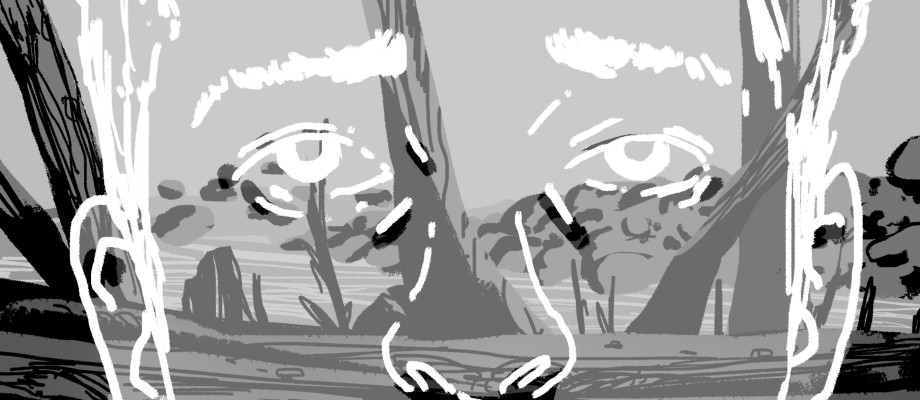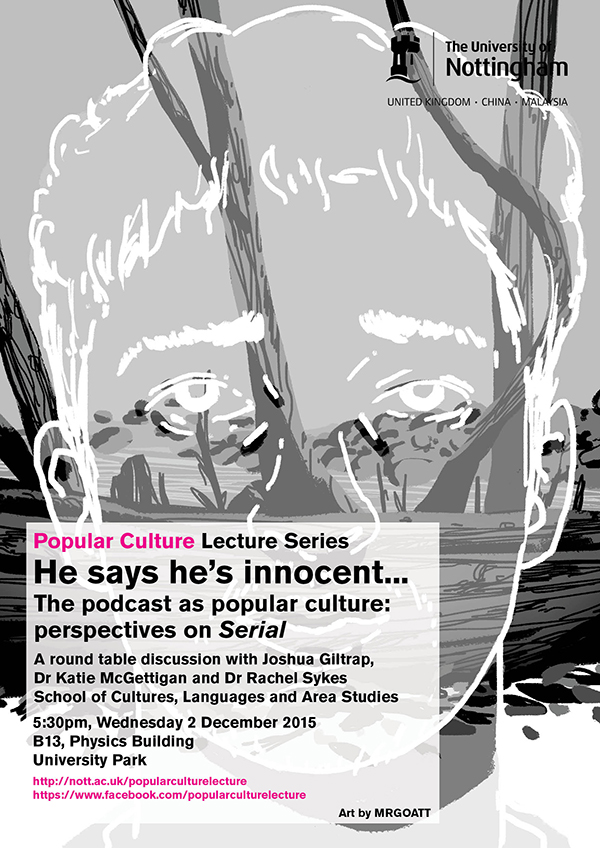He says he’s innocent… The podcast as popular culture: perspectives on ‘Serial’

Join this round table discussion with Joshua Giltrap, Dr Rachel Sykes and Dr Katie McGettigan, School of Cultures, Languages and Area Studies.
This event will unfold as a series of short presentations by each panelists followed by a round table discussion.
The American podcast Serial became a surprise overnight success when it aired in October 2014. Over twelve episodes, Serial examined the murder of Baltimore high school student, Hae Ming Lee in 1999, and investigated the conviction of her ex-boyfriend, Adnan Syed. Hooked by journalist Sarah Koenig’s intimate narration, Serial’s fans listened compulsively as Koenig and her team challenged evidence, discovered lost witnesses, and proposed new narratives – sometimes assisted by those fans, who posted theories and findings on online forums like Reddit. But Serial was a human story as well as a piece of investigative reporting, exploring how the crime affected families and communities, the problems of second-generation immigrants, and the workings of the criminal justice system.
Coinciding with the launch of Serial’s second season in Autumn 2015 and its syndication to Fox TV, this panel discussion evaluates the impact and originality of Serial, asking why a podcast about a fifteen year-old murder became so popular. In particular, it investigates whether we can analyse Serial in relation to existing genres, and how the podcast created a hunger for information in listeners, and a desire for closure that a true-life story may never satisfy. More widely, the panel reflects on the nature of popular culture in a digital age in which fans of, and participants in Serial can spread their own narratives as widely as the series itself.
“Objective journalism in Serial: challenging an ideal” – Joshua Giltrap
There is an ideal in journalism – particularly American journalism – that a story should be presented as an impartial presentation of the facts, which ultimately leaves the listener or reader to form their own opinions. I will put forward an argument that with Serial, Sarah Koenig and her team challenge this ideal, and suggest that true unbiased reporting may in fact be an impossible goal.
“The seriality of Serial” – Dr Katie McGettigan
This talk explores Serial’s structure as a serial: a narrative that is divided into segments, released over time, and that contains elements that connect the episodes and framing devices that refer backwards and forwards. I locate the podcast within a tradition of popular true crime serials that reaches back to nineteenth-century “scandal-sheet” periodicals, and includes the New Yorker’s serialization of Truman Capote’s In Cold Blood. But I also suggest that Serial’s non-linear structure and lack of conclusion subvert the expectations of a serial in ways that create pleasure and frustration for listeners.
“Too much information: Serial and undisclosed” – Dr Rachel Sykes
In April 2015, Rabia Chaudry, the lawyer of Adnan Syed who first brought Syed’s case to Koenig’s attention, launched a podcast called Undisclosed. A supplement and response to the success of Serial, Chaudry and her team “reframe, enhance or otherwise shift everything” that their listeners have come to know about the State of Maryland’s case against Adnan Syed. This paper examines how Undisclosed challenges what Chaudry calls the “beautifully crafted narrative” of Serial, providing a vital counter narrative that extends the listener’s knowledge of the state’s case against Syed and questions the thoroughness of Koenig’s investigative work. As such, I will examine the demand for information that followed Serial’s finale and ask to what extent the listener’s desire for “real” information can be satiated in the true crime genre.
Admission free, all welcome.
Part of the Popular Culture Lecture Series. For more information, visit their website. You can also follow them on Facebook and Twitter for updates.
Art by MRGOATT
Tags: Katie McGettigan, podcast, popular culture, Popular Culture Lecture Series, public lecture, Rachel Sykes, School of Cultures Languages and Area Studies
Leave a Reply
Upcoming Events


